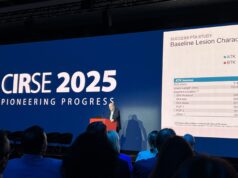 Cordis has announced the completion of patient enrolment in the RADIANCY premarket clinical study. The prospective, multicentre, single-arm study is designed to evaluate the safety and efficacy of the S.M.A.R.T. Radianz vascular stent system when used with the Brite Tip Radianz guiding sheath and Saberx Radianz percutaneous transluminal angioplasty (PTA) dilatation catheter for treatment of iliac and femoropopliteal artery lesions via radial artery access. Data from the RADIANCY study will be part of the clinical evidence towards pursuing the CE mark of the S.M.A.R.T. Radianz vascular stent system.
Cordis has announced the completion of patient enrolment in the RADIANCY premarket clinical study. The prospective, multicentre, single-arm study is designed to evaluate the safety and efficacy of the S.M.A.R.T. Radianz vascular stent system when used with the Brite Tip Radianz guiding sheath and Saberx Radianz percutaneous transluminal angioplasty (PTA) dilatation catheter for treatment of iliac and femoropopliteal artery lesions via radial artery access. Data from the RADIANCY study will be part of the clinical evidence towards pursuing the CE mark of the S.M.A.R.T. Radianz vascular stent system.
The RADIANCY study enrolled 151 patients at 12 sites across six European countries. The results of the first 100 patients were presented at Paris Vascular Insights (PVI; 8–10 November, Paris, France) by lead principal investigator Raphaël Coscas (Ambroise Paré Hospital, Boulogne-Billancourt, France). Coscas commented: “The results are very exciting and promising with excellent technical success (97.9%) and a great safety profile. These results attest to the technological innovation and patient advantages for peripheral arterial disease (PAD) treatment in terms of early mobility and safety. I applaud Cordis for a successful completion of this trial and strengthening the scientific evidence for radial to peripheral procedures.” The final results of the study are awaited.
“The transradial approach has been established as the standard access site in cardiology, with proven patient benefits such as less risk of complications at access site (bleeding, haematoma, groin infection), increased patient comfort, quicker time to ambulation/mobility of patients, and earlier discharge. With the Radianz radial peripheral system portfolio, we are proud to contribute to expanding these benefits to patients undergoing peripheral interventions,” added Dominique Boulet, president of Cordis EMEA.
The S.M.A.R.T. Radianz vascular stent system, specifically engineered for radial access, was approved for use by the US Food and Drug Administration (FDA) in February 2022, and by the Japanese Pharmaceuticals and Medical Devices Agency (PMDA) in March 2022.













